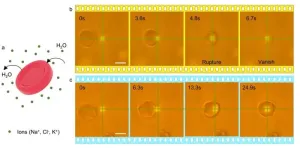(Press-News.org) PHILADELPHIA—(Nov. 1, 2023)—The Wistar Institute’s David B. Weiner, Ph.D., executive vice president, director of the Vaccine & Immunotherapy Center (VIC) and W.W. Smith Charitable Trust Distinguished Professor in Cancer Research, and collaborators, have engineered novel monoclonal antibodies that engage Natural Killer cells through a unique surface receptor that activates the immune system to fight against cancer.
In their publication titled, “Siglec-7 glyco-immune binding MAbs or NK cell engager biologics induce potent anti-tumor immunity against ovarian cancers,” published in Science Advances, the team demonstrates the preclinical feasibility of utilizing these new cancer immunotherapeutic approaches against diverse ovarian cancer types, including treatment-resistant and refractory ovarian cancers — alone or in combination with checkpoint inhibitor treatment.
The research started as a collaboration between Wistar’s Drs. Weiner and Mohamed Abdel-Mohsen, who were exploring the development of new glyco-signaling biologic tools that may be important in the fight against cancer.
Ovarian cancer (OC) is frequently diagnosed late in the disease process, and OC resistance to currently available treatments make it especially problematic; according to the NIH, the chances of someone diagnosed with OC and surviving for five years is around fifty-fifty. Ovarian cancer demonstrates a low response rate to standard-of-care treatments like chemotherapies, PARP inhibitors and the widely used checkpoint inhibitor, PD-1.
In the small proportion of ovarian cancer patients that do respond to these treatments, resistance becomes problematic over time — resulting in tumor escape and cancer progression. Genetic mutations, such as the well-known BRCA gene mutations, predispose women to a high risk of progressive OC. The CDC expects more than thirteen thousand women to die of ovarian cancer this year in the U.S. alone.
To combat ovarian cancer treatment resistance, the team hypothesized that they might be able to engage not only the traditional T cell immune arm of the immune system which PD-1 and known checkpoint inhibitors (CPI) activate, but also implement a strategy to activate Natural killer cells (NK cells), a subset of important anti-tumor immune cells, through a conserved glyco-immune marker found on the surface of most NK cells called Siglec-7 (Sialic acid-binding immunoglobulin-type lectin). NK cells have been recently described to express Siglec-7, so the team tested two new strategies to engage and activate NK cells against ovarian cancer through Siglec-7.
The first approach used human monoclonal antibodies (mAb) discovered and developed at Wistar and novel assays to visualize and demonstrate that certain anti-Siglec-7 mAbs could activate human NK cells — which, in the presence of the antibodies, responded against multiple human OC cell lines. These now-activated NK cells would kill OC but not non-cancer cells with the Siglec-7 mAb treatment.
The researchers demonstrated that multiple OC carrying mutations, including BRCA1 and BRCA2, could be targeted by Siglec-7 antibodies through activated NK cells. The group moved to study the treatment of OC in a humanized mouse model and observed that the Siglec-7 treatment could impact OC growth slowing the tumors and increasing the animals’ survival.
Having demonstrated the feasibility of utilizing a Siglec-7 mAb in OC models, the team thought there were additional ways to use the Siglec-7 mAb to further focus on OC disease. They hypothesized that directly fusing the Siglec-7 reactive binding site of the Siglec-7 mAb to a second mAb that uniquely binds late OC through a molecule named Follicle Stimulating Hormone receptor (FSHR), which they had previously developed, would create a targeted Siglec-7 bispecific antibody that could bind through two distinct targets creating a new class of NK cell engagers (NKCE).
The team sought to test whether this Siglec-7 NKCE approach would be effective through the direct linkage of potentially killer NK cells to a guided missile aimed specifically at OC, which would open up a new path to develop additional Siglec-7 based immunotherapeutic approaches. In both bench and humanized mouse challenge studies, the Siglec-7-NKCE was effective at targeting OC, activating NK cells in local proximity and efficiently killing multiple OC.
Both Siglec-7 technologies (mAbs and NKCEs) demonstrated an ability to recruit and activate the NK cell population, shrink tumors and prolong survival in the models studied. The observation of on-target specificity of the approaches suggests that cancer’s apparent Siglec vulnerability can be exploited therapeutically, perhaps with limited toxicity — a promising sign for the future of anti-cancer Siglec research, but the team cautions that more work in this regard is important.
In an additional set of preliminary studies, the team also found that this Siglec-7 approach could complement PD-1 checkpoint inhibitor (CPI) therapy. This is an important area of further study that could uncover more details of the mechanisms involved and possibly extend the utility of such CPI in OC and, potentially, other cancers. “These findings open the door to further exploration of how we can engineer Siglec-7 immunotherapies and perhaps other related molecules for ovarian cancer and perhaps a larger group of recalcitrant cancers,” stated Dr. David B. Weiner, adding, “Further studies may bring such approaches as described to represent new tools in our antitumor toolbelt.”
As always, more research is needed to refine these technologies further on the long journey from the lab bench to the clinic. But this paper offers a different avenue for attempting to exploit these unique interactions of immune surface molecules such as Siglec-7 and perhaps other Siglecs.
“We have observed not one but two methods that can target NK cells in an effort to control ovarian cancer in both Petri dishes and in vivo models,” said Dr. Devivasha Bordoloi, the first author on the paper. “This research shows a lot of promise, and I’m excited to move these studies to the next steps.”
Co-authors: Devivasha Bordoloi, Abhijeet J. Kulkarni, Opeyemi S. Adeniji, Pratik S. Bhojnagarwala, Shushu Zhao, Candice Ionescu, Alfredo Perales-Puchalt, Elizabeth M Parzych, Xizhou Zhu, Ali R. Ali, Joel Cassel, Rugang Zhang, Mohamed Abdel-Mohsen and David B. Weiner of The Wistar Institute; and M. Betina Pampena and Michael R. Betts of Perelman School of Medicine, University of Pennsylvania,
Work supported by: Department of Defense Ovarian Cancer Research Program award W81XWH-19-1-0189; the W.W. Smith Charitable Trust Professorship in Cancer Research; and the Wistar Science Accelerator Postdoctoral Fellowship.
Publication information: “Siglec-7 glyco-immune binding MAbs or NK cell engager biologics induce potent anti-tumor immunity against ovarian cancers,” from Science Advances
###
The Wistar Institute, the first independent, nonprofit biomedical research institute in the United States, marshals the talents of an international team of outstanding scientists through a culture of biomedical collaboration and innovation. Wistar scientists are focused on solving some of the world’s most challenging and important problems in the field of cancer, infectious disease, and immunology. Wistar has been producing groundbreaking advances in world health for more than a century, consistent with its legacy of leadership in biomedical research and a track record of life-saving contributions in immunology and cell biology. wistar.org.
END
Wistar scientists engineer new NK cell engaging immunotherapy approaches to target and potentially treat recalcitrant ovarian cancer
Novel human Siglec-7 monoclonal and bispecific antibodies are being developed as potential future cancer immunotherapies
2023-11-01
ELSE PRESS RELEASES FROM THIS DATE:
PLOS Complex Systems and PLOS Mental Health now open for submissions!
2023-11-01
SAN FRANCISCO —The Public Library of Science (PLOS) is pleased to announce that PLOS Complex Systems and PLOS Mental Health are now open for submissions. Both journals have a strong community of editors who will represent the full diversity of the research communities we aim to serve.
PLOS Mental Health is an inclusive journal led by Editors-in-Chief Charlene Sunkel and Rochelle Burgess, working alongside staff Executive Editor Karli Montague-Cardoso and in collaboration with a diverse Editorial Board. The journal is seeking research that addresses challenges and gaps in the field of mental health research, ...
The remains of an ancient planet lie deep within Earth
2023-11-01
In the 1980s, geophysicists made a startling discovery: two continent-sized blobs of unusual material were found deep near the center of the Earth, one beneath the African continent and one beneath the Pacific Ocean. Each blob is twice the size of the Moon and likely composed of different proportions of elements than the mantle surrounding it.
Where did these strange blobs—formally known as large low-velocity provinces (LLVPs)—come from? A new study led by Caltech researchers suggests that they are remnants of an ancient planet that violently collided with Earth billions of years ago in the same giant impact that created ...
New twist on optical tweezers
2023-11-01
Optical tweezers manipulate tiny things like cells and nanoparticles using lasers. While they might sound like tractor beams from science fiction, the fact is their development garnered scientists a Nobel Prize in 2018.
Scientists have now used supercomputers to make optical tweezers safer to use on living cells with applications to cancer therapy, environmental monitoring, and more.
“We believe our research is one significant step closer towards the industrialization of optical tweezers in biological applications, specifically in both selective cellular surgery and targeted drug delivery,” ...
Stigma felt by opioid-dependent moms impacts the health care received by their babies
2023-11-01
COLUMBIA, Mo. -- The rate of opioid use among pregnant women in the United States quadrupled between 1999 and 2014 and continues to rise — an alarming trend that researchers from the University of Missouri and University of Iowa say has exposed the stigma felt by opioid-dependent mothers and how their shame has negatively impacted the health care received by their infants.
Jamie Morton led a study, which was a metasynthesis of existing literature on the topic, as a doctoral student at the MU Sinclair School of Nursing. She said the findings can help ensure health care providers, family ...
The ringed seals in Ilulissat Icefjord, Greenland are special
2023-11-01
Exploring Arctic nature can be difficult. Harsh conditions and great distances are significant challenges when researchers want to coax secrets out of nature.
However, a research project, led by Greenlandic and Danish researchers, has now succeeded in describing a new type of ringed seal that lives in the Icefjord near Ilulissat in West Greenland; a unique natural area on the UNESCO World Heritage List.
The results have just been published in the renowned scientific journal Molecular Ecology.
A small population
Over ...
NRL ISS Mission seeks new bioinspired materials
2023-11-01
WASHINGTON – The U.S. Naval Research Laboratory’s Melanized Microbes for Multiple Uses in Space Project, or MELSP, will use the International Space Station (ISS) to search for production of melanin variants and other useful biomaterials that can have applications both on Earth and in space. The mission is scheduled to launch in early November 2023.
Melanin is described as a group of biopolymers responsible for various biological functions, including pigmentation of skin, hair, and iris of the eyes, which helps protect body ...
Pinpointing HIV immune response
2023-11-01
New research combining computer modeling and experiments with macaques shows the body’s immune system helps control human immunodeficiency virus (HIV) infections largely by suppressing viral production in already infected cells while also killing viral infected cells, but only within a narrow time window at the start of a cell’s infection.
“To eliminate HIV, we have to understand how the immune system attempts to control the infection,” said Ruy M. Ribeiro, a theoretical biologist at Los Alamos National Laboratory who led the development of the model ...
First mice engineered to survive COVID-19 like young, healthy humans
2023-11-01
Researchers have genetically engineered the first mice that get a human-like form of COVID-19, according to a study published online November 1 in Nature.
Led by researchers from NYU Grossman School of Medicine, the new work created lab mice with human genetic material for ACE2 – a protein snagged by the pandemic virus so it can attach to human cells as part of the infection. The mice with this genetic change developed symptoms similar to young humans infected with the virus causing COVID-19, instead of dying ...
As people live longer, family caregivers face financial challenges
2023-11-01
PHILADELPHIA (November 1, 2023) – Many people overlook the short- and long-term costs of financial caregiving, a growing problem that financial advisors and employers can help address, according to a new report by the TIAA Institute and the University of Pennsylvania School of Nursing (Penn Nursing).
One in five adults now provide uncompensated care to loved ones with health problems, and the report provides a comprehensive compilation of insights and research that underscores how the caregivers face a ...
Human mini guts reveal new insights into the process leading to Cronkhite-Canada syndrome and potential new therapies
2023-11-01
Researchers at Baylor College of Medicine and collaborating institutions working with human intestinal organoids, also called mini guts, have shed new light on the potential causes of Cronkhite-Canada syndrome, a rare condition characterized by abundant non-cancerous growths or polyps in the intestine and other symptoms such as hair and nail loss and changes in skin pigmentation. Published in The Journal of Clinical Investigation, the study is the first to show a connection between high polyp proliferation and increased levels of serotonin produced by the intestinal epithelium.
The findings suggest a potential new approach to treat this disease with serotonin ...
LAST 30 PRESS RELEASES:
Mayo Clinic study finds single dose of non-prescribed Adderall raises blood pressure and heart rate in healthy young adults
Engineered immune cells show promise against brain metastases in preclinical study
Improved EV battery technology will outmatch degradation from climate change
AI cancer tools risk “shortcut learning” rather than detecting true biology
Painless skin patch offers new way to monitor immune health
Children with poor oral health more often develop cardiovascular disease as adults
GLP-1 drugs associated with reduced need for emergency care for migraine
New knowledge on heritability paves the way for better treatment of people with chronic inflammatory bowel disease
Under the Lens: Microbiologists Nicola Holden and Gil Domingue weigh in on the raw milk debate
Science reveals why you can’t resist a snack – even when you’re full
Kidney cancer study finds belzutifan plus pembrolizumab post-surgery helps patients at high risk for relapse stay cancer-free longer
Alkali cation effects in electrochemical carbon dioxide reduction
Test platforms for charging wireless cars now fit on a bench
$3 million NIH grant funds national study of Medicare Advantage’s benefit expansion into social supports
Amplified Sciences achieves CAP accreditation for cutting-edge diagnostic lab
Fred Hutch announces 12 recipients of the annual Harold M. Weintraub Graduate Student Award
Native forest litter helps rebuild soil life in post-mining landscapes
Mountain soils in arid regions may emit more greenhouse gas as climate shifts, new study finds
Pairing biochar with other soil amendments could unlock stronger gains in soil health
Why do we get a skip in our step when we’re happy? Thank dopamine
UC Irvine scientists uncover cellular mechanism behind muscle repair
Platform to map living brain noninvasively takes next big step
Stress-testing the Cascadia Subduction Zone reveals variability that could impact how earthquakes spread
We may be underestimating the true carbon cost of northern wildfires
Blood test predicts which bladder cancer patients may safely skip surgery
Kennesaw State's Vijay Anand honored as National Academy of Inventors Senior Member
Recovery from whaling reveals the role of age in Humpback reproduction
Can the canny tick help prevent disease like MS and cancer?
Newcomer children show lower rates of emergency department use for non‑urgent conditions, study finds
Cognitive and neuropsychiatric function in former American football players
[Press-News.org] Wistar scientists engineer new NK cell engaging immunotherapy approaches to target and potentially treat recalcitrant ovarian cancerNovel human Siglec-7 monoclonal and bispecific antibodies are being developed as potential future cancer immunotherapies





